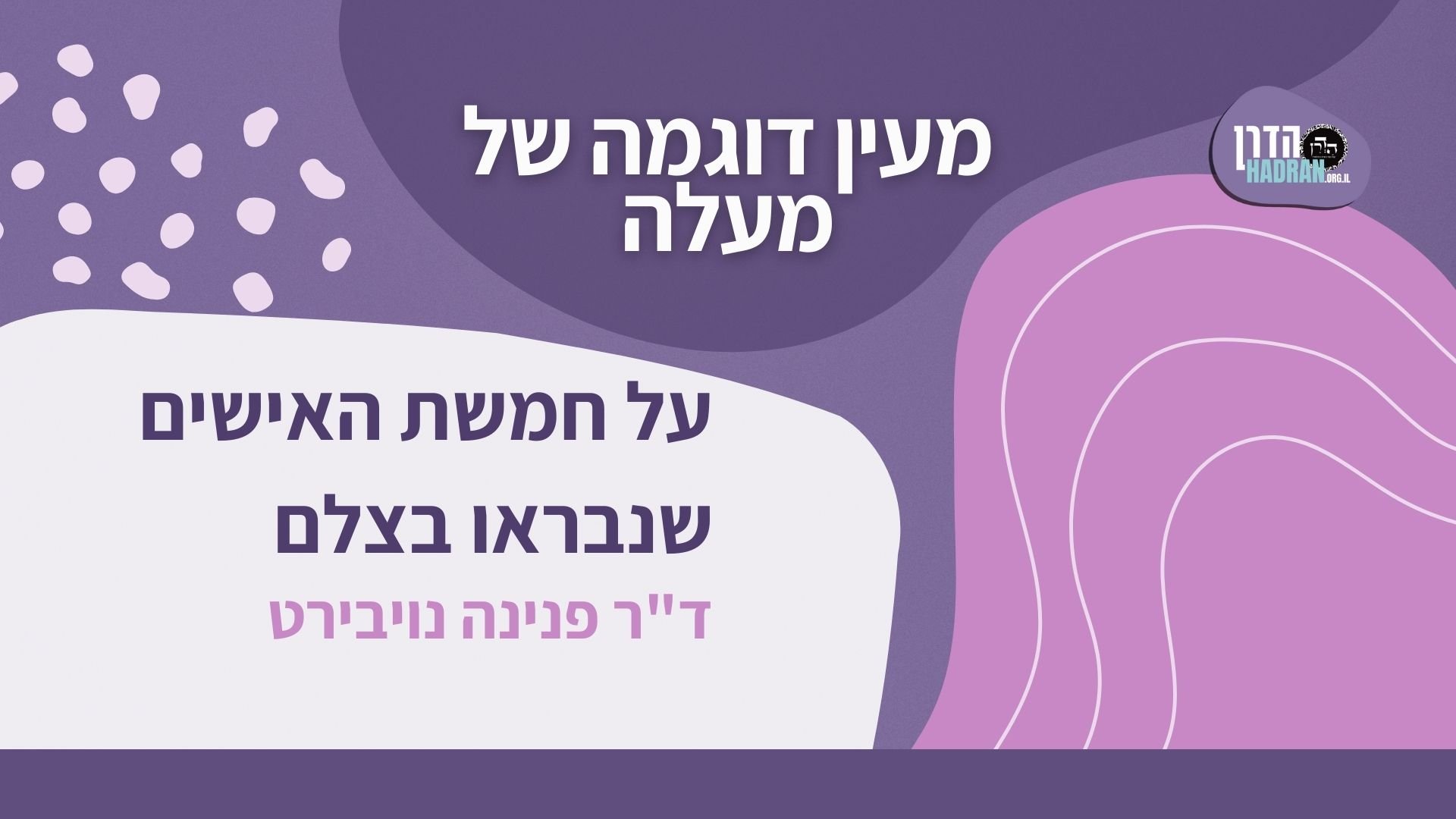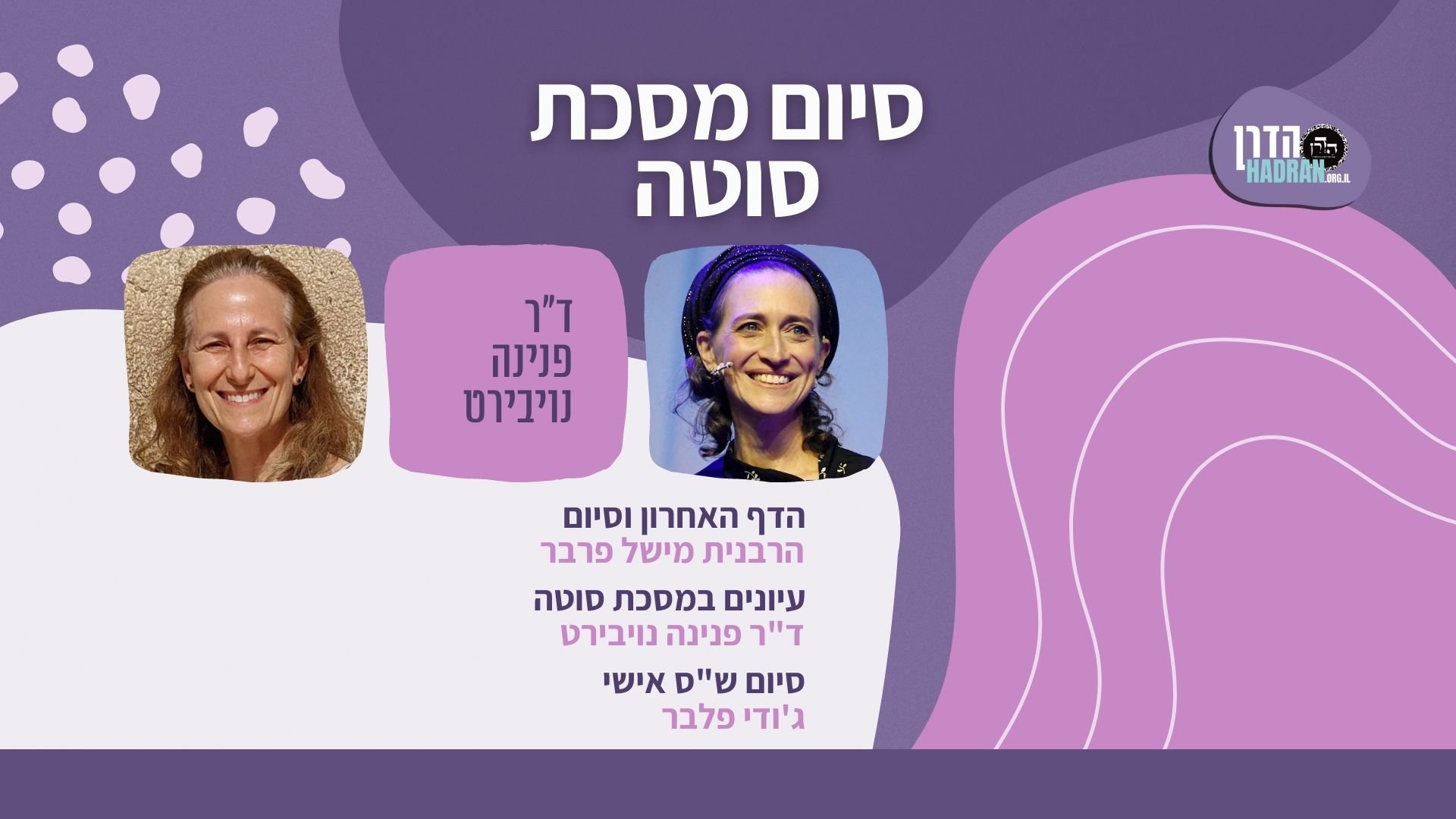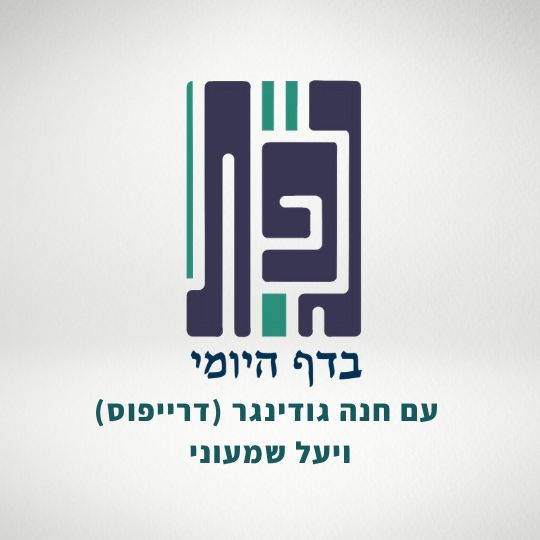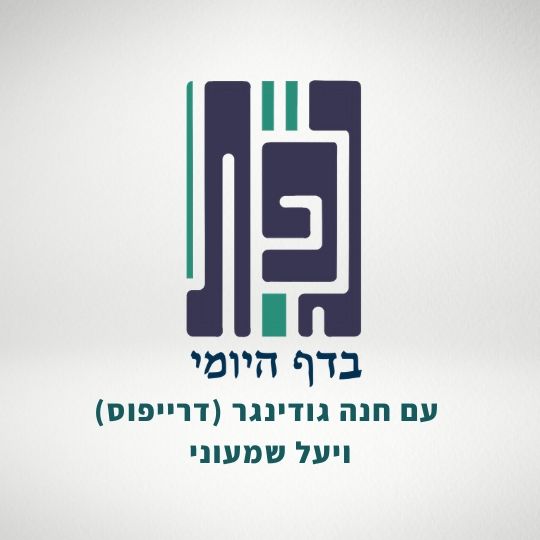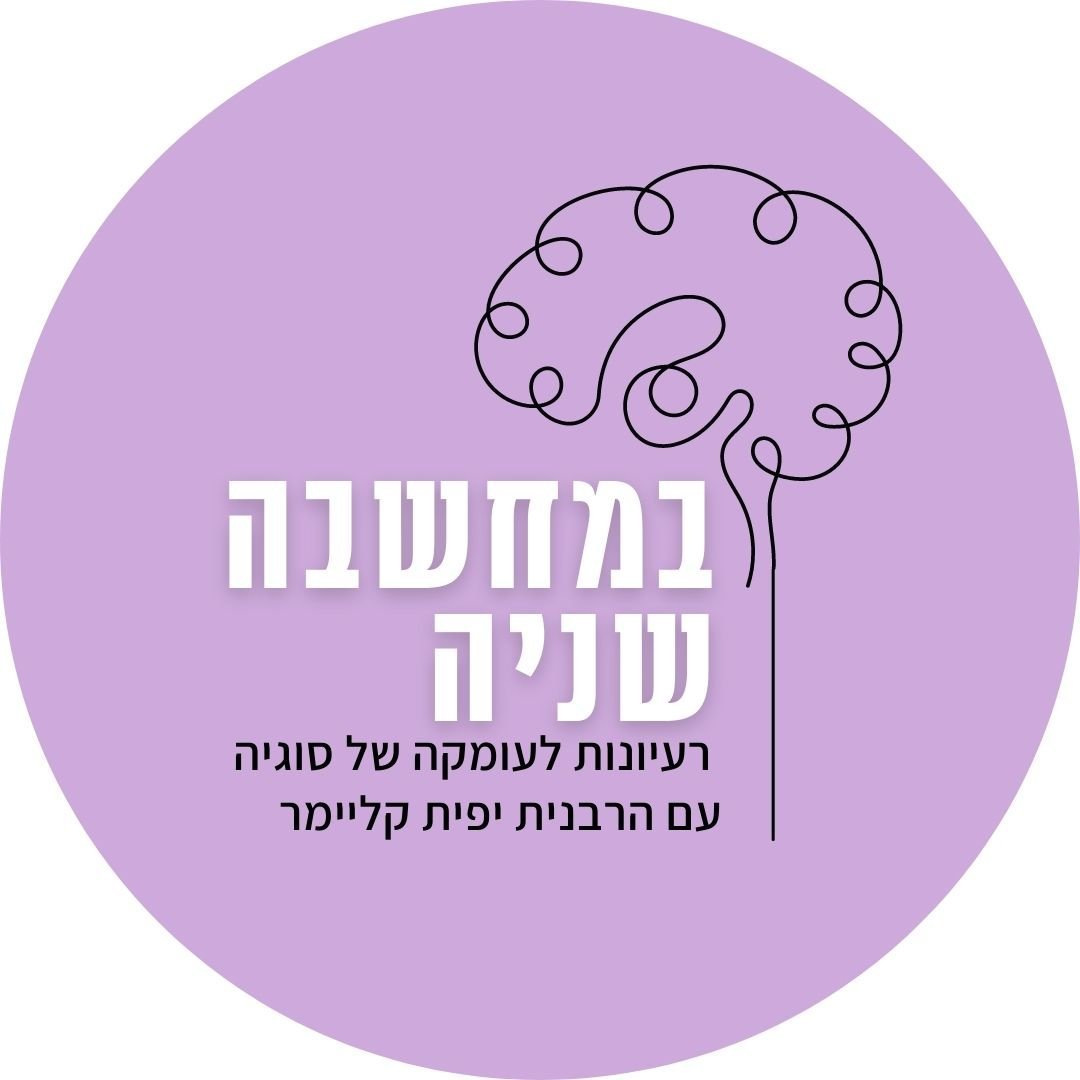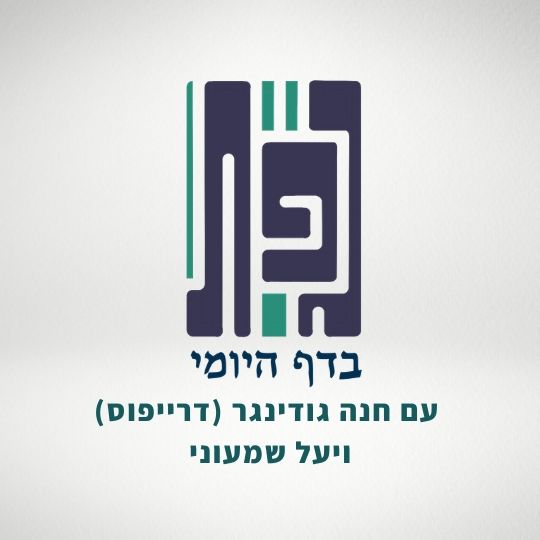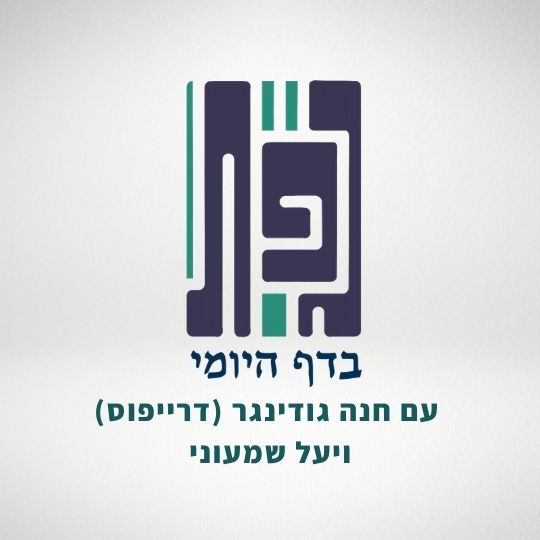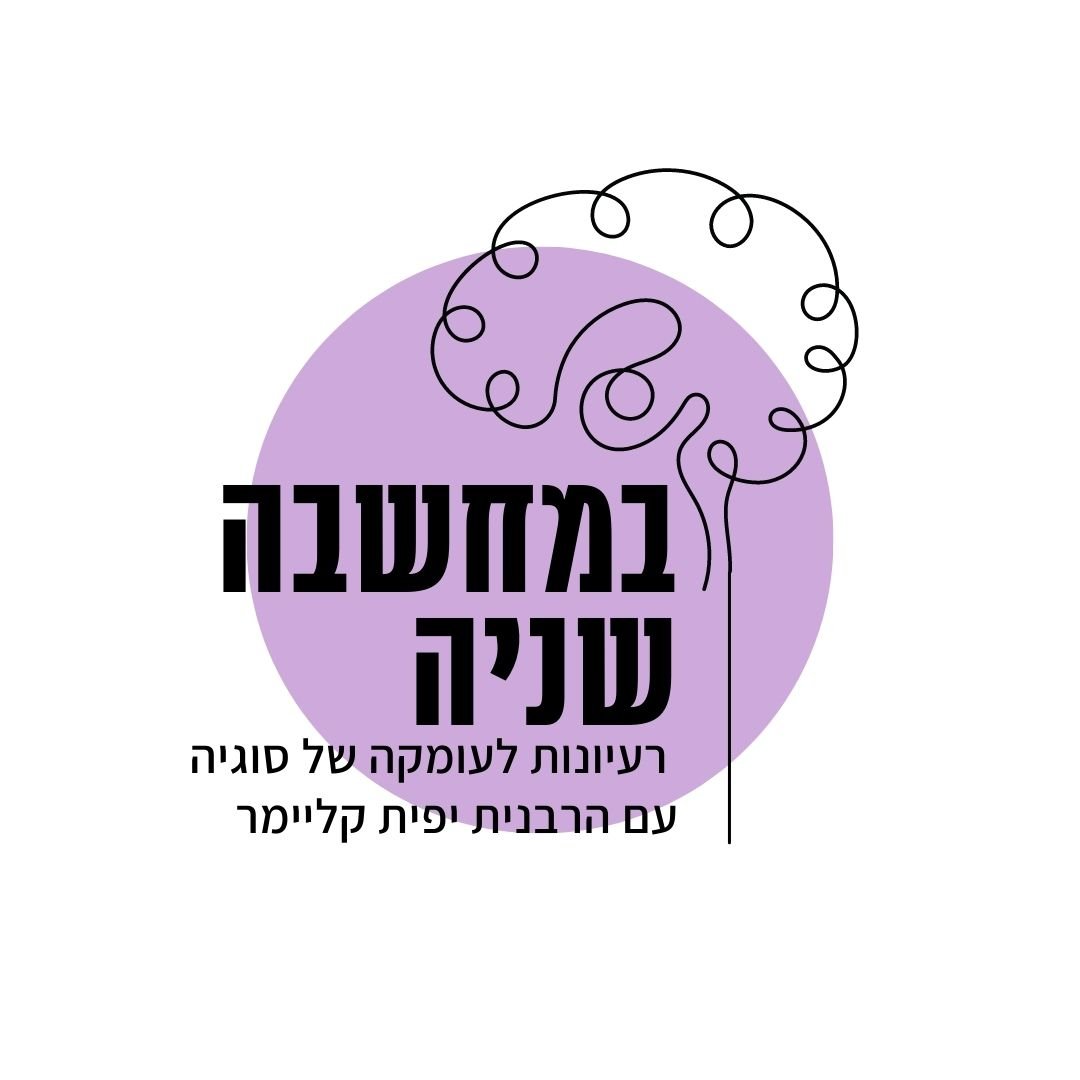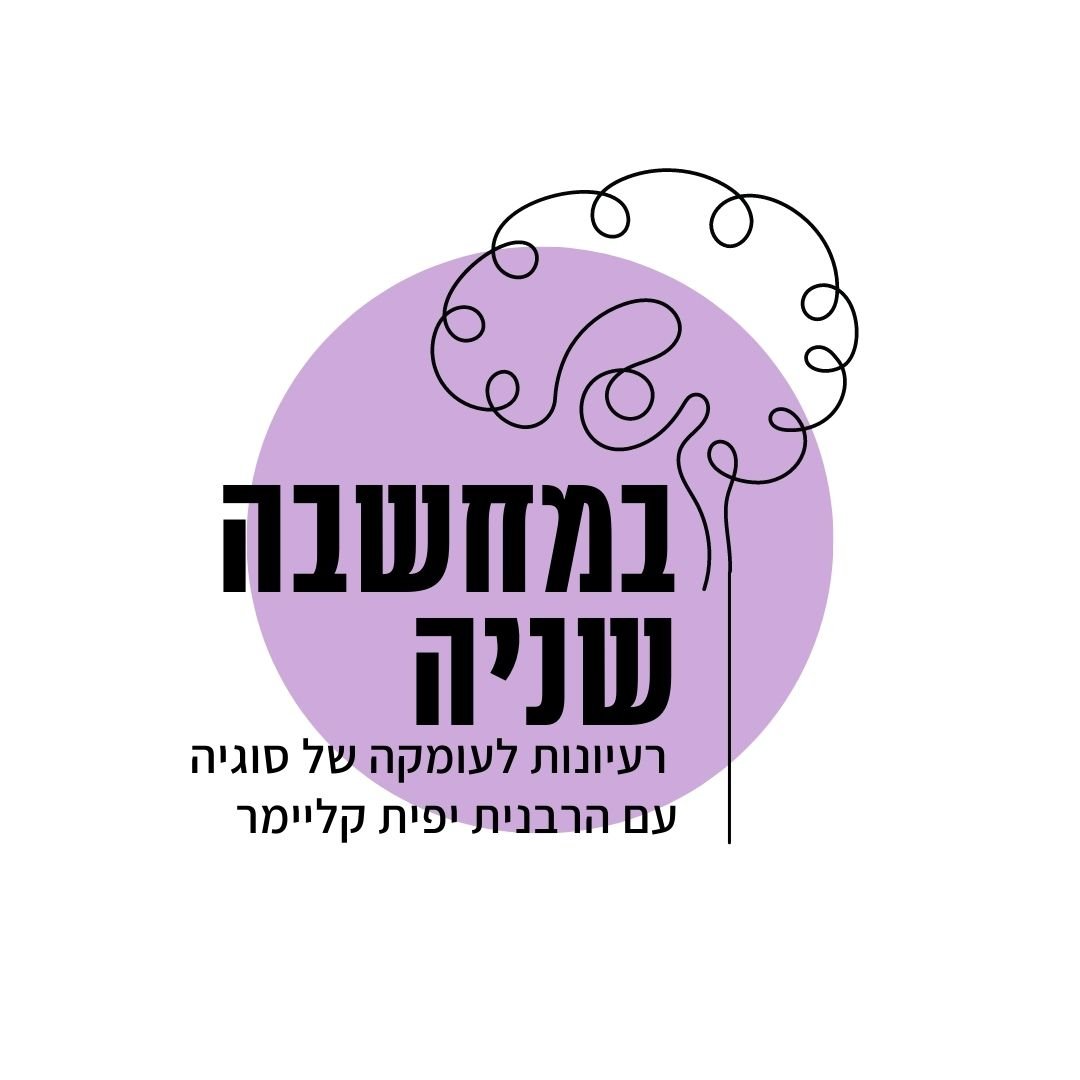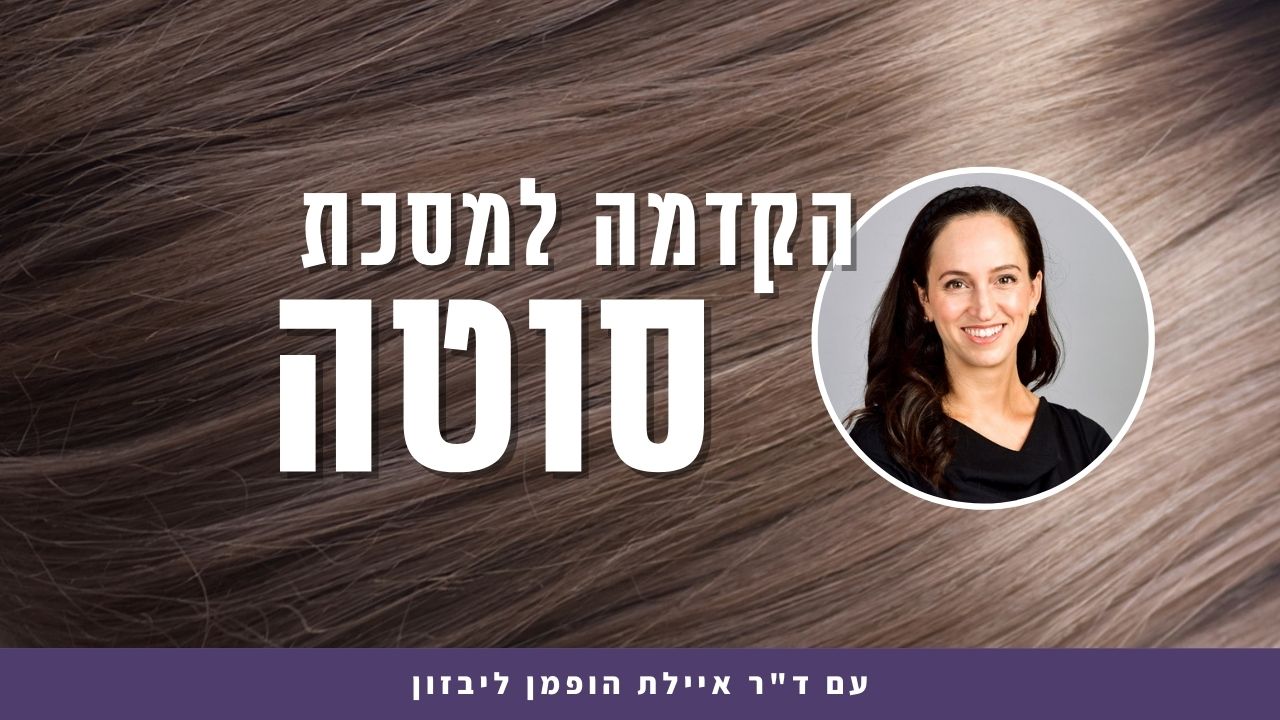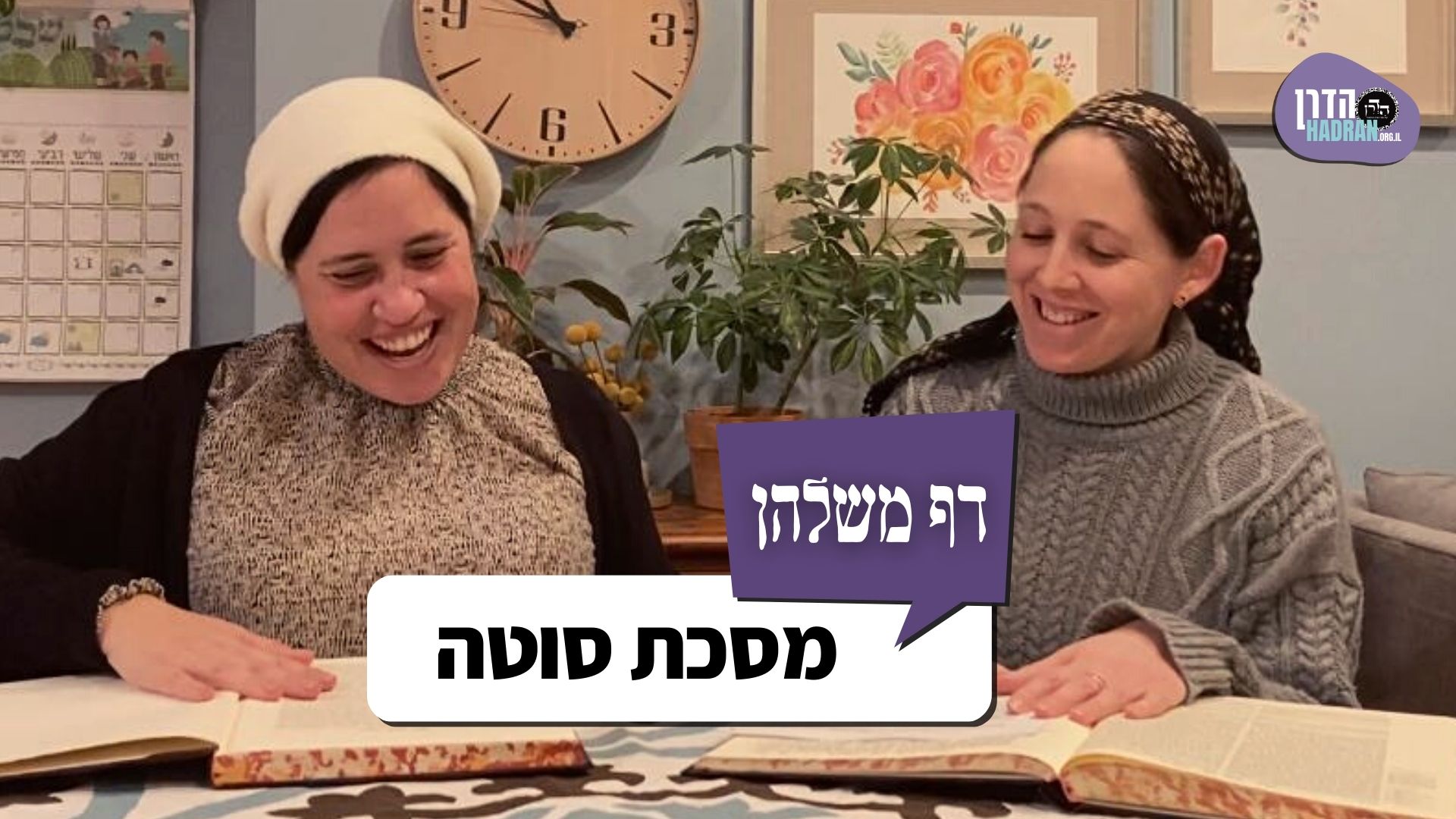כשפותחים ספר תורה בבית הכנסת, אסור לדבר אפילו בדבר הלכה. מציעים שני פסוקים שונים שמהם דורשים הלכה זו. כהן חייב לרחוץ ידיו לפני שמברך את העם ומובא פסוק כהוכחה. כשנשאל רבי אלעזר בן שמוע מדוע הוא זכה לאריכות ימים, ענה שהוא מקפיד על שלושה דברים – לא לעשות את בית הכנסת קיצור דרך (קפנדריא), לא לעבור על אנשים להגיע למקומו בבית המדרש ולא לומר ברכת כהנים בלי לברך. מה נוסח הברכה שמברכים הכהנים לפני שמברכים את העם בשלושת הפסוקים? מה אומרים לפני שעולים לאמר את הברכה? מה אומרים אחרי שמסיימים את הברכה ופונים מהעם ואל ארון הקודש? כללים נוספים הן לגבי ברכת הכהנים והן לגבי קריאת התורה מפורטים, כולל המתנה לסיום מלא של כל סעיף או שיסיימו לענות אמן לפני ההמשך לסעיף הבא. מי שקורא את ההפטרה, צריך קודם לקרוא מהתורה. יש לגלגל את התורה במלואה, לפני תחילת ההפטרה. איך יוציאו את התורה מבית הכנסת – האם צריך להוציאה לפני כל העם? במה זה תלוי? אילו פסוקים היו אומרים העם כשהכהנים היו אומרים ברכת כהנים?
הלימוד החודש מוקדש לרפואת פיליס הכט, גיטל פעשא בת מאשה רחל על ידי חברותיה הרבות שאוהבות ומעריכות אותה.
רוצה להקדיש שיעור?

כלים
הלימוד החודש מוקדש לרפואת פיליס הכט, גיטל פעשא בת מאשה רחל על ידי חברותיה הרבות שאוהבות ומעריכות אותה.
כלים
העמקה
רוצה להבין מה באמת קורה מתחת לפני השטח של הסוגיה?
שיעורים, פודקאסטים והרחבות של מיטב המורות שלנו יפתחו לך עוד זוויות וכיווני חשיבה.
חדשה בלימוד הגמרא?
זה הדף הראשון שלך? איזו התרגשות עצומה! יש לנו בדיוק את התכנים והכלים שיעזרו לך לעשות את הצעדים הראשונים ללמידה בקצב וברמה שלך, כך תוכלי להרגיש בנוח גם בתוך הסוגיות המורכבות ומאתגרות.
פסיפס הלומדות שלנו
גלי את קהילת הלומדות שלנו, מגוון נשים, רקעים וסיפורים. כולן חלק מתנועה ומסע מרגש ועוצמתי.
סוטה לט
וְהִזָּה לְאַחֲרָיו, לְאַחֲרָיו וְהִזָּה לְפָנָיו — הַזָּאָתוֹ פְּסוּלָה. לְפָנָיו וְהִזָּה עַל צְדָדִין שֶׁבְּפָנָיו — הַזָּאָתוֹ כְּשֵׁרָה.
and instead he sprinkled it backward, or if he intended to sprinkle the water backward and instead he sprinkled it forward, even if the water lands on vessels that require purification, his sprinkling is invalid. However, if one intended to sprinkle the water forward and instead he sprinkled it forward to the sides, his sprinkling is valid. It is derived from here that one’s sides are considered as though they were in front of him.
אָמַר רָבָא בַּר רַב הוּנָא: כֵּיוָן שֶׁנִּפְתַּח סֵפֶר תּוֹרָה אָסוּר לְסַפֵּר אֲפִילּוּ בִּדְבַר הֲלָכָה, שֶׁנֶּאֱמַר: ״וּבְפִתְחוֹ עָמְדוּ כׇּל הָעָם״, וְאֵין עֲמִידָה אֶלָּא שְׁתִיקָה, שֶׁנֶּאֱמַר: ״וְהוֹחַלְתִּי כִּי לֹא יְדַבֵּרוּ כִּי עָמְדוּ לֹא עָנוּ עוֹד״. רַבִּי זֵירָא אָמַר רַב חִסְדָּא, מֵהָכָא: ״וְאׇזְנֵי כׇל הָעָם אֶל סֵפֶר הַתּוֹרָה״.
§ Rava bar Rav Huna says: Once a Torah scroll has been opened, it is prohibited to converse, even about a matter of halakha. As it is stated: “And Ezra opened the book in the sight of all the people, for he was above all the people, and when he opened it, all the people stood up” (Nehemiah 8:5), and standing is referring to nothing other than silence, as it is stated: “And shall I wait, because they do not speak, because they stand still, and answer no more?” (Job 32:16). Rabbi Zeira said that Rav Ḥisda said: The prohibition against conversing is derived from here: “And the ears of all the people were attentive to the book of the law” (Nehemiah 8:3). They were not listening to any other voice.
וְאָמַר רַבִּי יְהוֹשֻׁעַ בֶּן לֵוִי: כׇּל כֹּהֵן שֶׁלֹּא נָטַל יָדָיו — לֹא יִשָּׂא אֶת כַּפָּיו, שֶׁנֶּאֱמַר: ״שְׂאוּ יְדֵיכֶם קֹדֶשׁ וּבָרְכוּ אֶת ה׳״.
And Rabbi Yehoshua ben Levi says: Any priest who did not first wash his hands may not lift his hands to recite the Priestly Benediction; as it is stated: “Lift up [se’u] your hands in sanctity and bless the Lord” (Psalms 134:2), which teaches that before reciting the benediction one must sanctify his hands by washing them.
שָׁאֲלוּ תַּלְמִידָיו אֶת רַבִּי אֶלְעָזָר בֶּן שַׁמּוּעַ: בַּמָּה הֶאֱרַכְתָּ יָמִים? אָמַר לָהֶן: מִיָּמַי לֹא עָשִׂיתִי בֵּית הַכְּנֶסֶת קַפֶּנְדַּרְיָא, וְלֹא פָּסַעְתִּי עַל רָאשֵׁי עַם קוֹדֶשׁ, וְלֹא נָשָׂאתִי כַּפַּי בְּלֹא בְּרָכָה.
§ Rabbi Elazar ben Shammua was once asked by his disciples: To what do you attribute your longevity? He said to them: In all my days, I never made a shortcut [kappendarya] through a synagogue. Nor did I ever stride over the heads of the sacred people, i.e., I never stepped over people sitting in the study hall in order to reach my place, so as not to appear scornful of them. And I never lifted my hands for the Priestly Benediction without first reciting a blessing.
מַאי מְבָרֵךְ? אָמַר רַבִּי זֵירָא אָמַר רַב חִסְדָּא: ״אֲשֶׁר קִדְּשָׁנוּ בִּקְדוּשָּׁתוֹ שֶׁל אַהֲרֹן וְצִוָּנוּ לְבָרֵךְ אֶת עַמּוֹ יִשְׂרָאֵל בְּאַהֲבָה״.
The Gemara asks: What blessing do the priests recite before the benediction? Rabbi Zeira says that Rav Ḥisda says: Blessed are You, Lord our God, King of the universe, Who has sanctified us with the sanctity of Aaron and commanded us to bless His people, Israel, with love.
כִּי עָקַר כַּרְעֵיהּ מַאי אָמַר? יְהִי רָצוֹן מִלְּפָנֶיךָ ה׳ אֱלֹהֵינוּ שֶׁתְּהֵא בְּרָכָה זוֹ שֶׁצִּוִּיתָנוּ לְבָרֵךְ אֶת עַמְּךָ יִשְׂרָאֵל, לֹא יְהֵא בָּהּ מִכְשׁוֹל וְעָוֹן. וְכִי מַהְדַּר אַפֵּיהּ מִצִּיבּוּרָא מַאי אָמַר? אַדְבְּרֵיהּ רַב חִסְדָּא לְרַב עוּקְבָא וּדְרַשׁ: ״רִבּוֹנוֹ שֶׁל עוֹלָם עָשִׂינוּ מַה שֶּׁגָּזַרְתָּ עָלֵינוּ עֲשֵׂה עִמָּנוּ
The Gemara continues: When the priest begins walking to the platform to recite the benediction, what does he say? The Gemara answers: May it be Your will, Lord our God, that this blessing with which You have commanded us to bless Your people, Israel, shall not contain any stumbling block or iniquity. And when the benediction has been completed, when he turns his face away from the congregation, what does he say? Rav Ḥisda instructed Rav Ukva and taught him that this is what he would say: Master of the Universe, we have performed that which You decreed upon us. Do unto us
מַה שֶּׁהִבְטַחְתָּנוּ. הַשְׁקִיפָה מִמְּעוֹן קׇדְשְׁךָ מִן הַשָּׁמַיִם וְגוֹ׳״.
as You have promised us, namely: “So shall they put My name upon the children of Israel, and I will bless them” (Numbers 6:27). “Look forth from your holy habitation, from heaven, and bless Your people, Israel” (Deuteronomy 26:15).
אָמַר רַב חִסְדָּא: אֵין הַכֹּהֲנִים רַשָּׁאִים לָכוֹף קִישְׁרֵי אֶצְבְּעוֹתֵיהֶן עַד שֶׁיַּחְזִרוּ פְּנֵיהֶם מִן הַצִּבּוּר. אָמַר רַבִּי זֵירָא אָמַר רַב חִסְדָּא: אֵין הַקּוֹרֵא רַשַּׁאי לִקְרוֹת ״כֹּהֲנִים״ עַד שֶׁיִּכְלֶה ״אָמֵן״ מִפִּי הַצִּבּוּר,
§ Rav Ḥisda says: The priests who spread their hands open during the benediction are not permitted to bend the joints of their fingers until they turn their faces away from the congregation once they have completed the benediction. Rabbi Zeira says that Rav Ḥisda says: The one who calls the priests forward is not permitted to call out: Priests, until the response amen to the blessing of thanksgiving concludes from the mouths of the congregation, in order to ensure that everyone will hear the voices of the priests.
וְאֵין הַכֹּהֲנִים רַשָּׁאִין לְהַתְחִיל בִּבְרָכָה עַד שֶׁיִּכְלֶה דִּיבּוּר מִפִּי הַקּוֹרֵא, וְאֵין הַצִּבּוּר רַשָּׁאִין לַעֲנוֹת ״אָמֵן״ עַד שֶׁתִּכְלֶה בְּרָכָה מִפִּי הַכֹּהֲנִים, וְאֵין הַכֹּהֲנִים רַשָּׁאִין לְהַתְחִיל בִּבְרָכָה אַחֶרֶת עַד שֶׁיִּכְלֶה ״אָמֵן״ מִפִּי הַצִּבּוּר.
And for the same reason, the priests are not permitted to begin reciting the benediction until the statement of the caller, i.e., his announcement: Priests, concludes from his mouth. And the congregation is not permitted to answer amen until the blessing concludes from the mouths of the priests. And the priests are not permitted to begin reciting another blessing until the response amen to the previous blessing concludes from the mouths of the congregation.
וְאָמַר רַבִּי זֵירָא אָמַר רַב חִסְדָּא: אֵין הַכֹּהֲנִים רַשָּׁאִין לְהַחְזִיר פְּנֵיהֶם מִן הַצִּבּוּר עַד שֶׁיַּתְחִיל שְׁלִיחַ צִבּוּר בְּ״שִׂים שָׁלוֹם״, וְאֵינָן רַשָּׁאִין לַעֲקוֹר רַגְלֵיהֶם וְלֵילֵךְ עַד שֶׁיִּגְמוֹר שְׁלִיחַ צִבּוּר ״שִׂים שָׁלוֹם״.
And Rabbi Zeira says that Rav Ḥisda says: The priests are not permitted to turn away from the congregation after they have completed the benediction until the prayer leader begins saying the blessing of: Grant peace. And they are not permitted to uproot their feet and walk away from the platform until the prayer leader finishes saying the blessing of: Grant peace.
וְאָמַר רַבִּי זֵירָא אָמַר רַב חִסְדָּא: אֵין הַצִּבּוּר רַשָּׁאִין לַעֲנוֹת ״אָמֵן״ עַד שֶׁתִּכְלֶה בְּרָכָה מִפִּי הַקּוֹרֵא, וְאֵין הַקּוֹרֵא רַשַּׁאי לִקְרוֹת בַּתּוֹרָה עַד שֶׁיִּכְלֶה ״אָמֵן״ מִפִּי הַצִּבּוּר, וְאֵין הַמְתַרְגֵּם רַשַּׁאי לְהַתְחִיל בַּתַּרְגּוּם עַד שֶׁיִּכְלֶה פָּסוּק מִפִּי הַקּוֹרֵא, וְאֵין הַקּוֹרֵא רַשַּׁאי לְהַתְחִיל בְּפָסוּק אַחֵר עַד שֶׁיִּכְלֶה תַּרְגּוּם מִפִּי הַמְתַרְגֵּם.
And in a similar vein, Rabbi Zeira says that Rav Ḥisda says: The congregation is not permitted to answer amen to the blessing recited over the Torah reading until the blessing of the one reading from the Torah concludes from his mouth. And the reader is not permitted to begin reading from the Torah until the response amen to the preceding blessing concludes from the mouths of the congregation. And the translator is not permitted to begin the translation of the Torah reading until the reading of the verse from the Torah concludes from the mouth of the reader. And the reader is not permitted to begin reading another verse until the translation concludes from the mouth of the translator.
אָמַר רַבִּי תַּנְחוּם אָמַר רַבִּי יְהוֹשֻׁעַ בֶּן לֵוִי: הַמַּפְטִיר בְּנָבִיא, צָרִיךְ שֶׁיִּקְרָא בַּתּוֹרָה תְּחִילָּה, וְאָמַר רַבִּי תַּנְחוּם אָמַר רַבִּי יְהוֹשֻׁעַ בֶּן לֵוִי: אֵין הַמַּפְטִיר רַשַּׁאי לְהַפְטִיר בַּנָּבִיא עַד שֶׁיִּגָּלֵל סֵפֶר תּוֹרָה.
Rabbi Tanḥum says that Rabbi Yehoshua ben Levi says: The one who concludes with a reading from the Prophets [haftara] must first read several verses from the Torah. And Rabbi Tanḥum says that Rabbi Yehoshua ben Levi says: The one who concludes is not permitted to conclude with a reading from the Prophets until the Torah scroll is furled.
וְאָמַר רַבִּי תַּנְחוּם אָמַר רַבִּי יְהוֹשֻׁעַ בֶּן לֵוִי: אֵין שְׁלִיחַ צִבּוּר רַשַּׁאי לְהַפְשִׁיט אֶת הַתֵּיבָה בַּצִּבּוּר, מִפְּנֵי כְּבוֹד צִבּוּר.
And Rabbi Tanḥum says that Rabbi Yehoshua ben Levi says: The prayer leader is not permitted to uncover the decorative covering of the ark in public, out of respect for the congregation. It is inappropriate to have the congregation wait while doing this.
וְאָמַר רַבִּי תַּנְחוּם אָמַר רַבִּי יְהוֹשֻׁעַ בֶּן לֵוִי: אֵין הַצִּבּוּר רַשָּׁאִין לָצֵאת, עַד שֶׁיִּנָּטֵל סֵפֶר תּוֹרָה וְיָנֻיחַ בִּמְקוֹמוֹ. וּשְׁמוּאֵל אָמַר: עַד שֶׁיֵּצֵא.
And Rabbi Tanḥum says that Rabbi Yehoshua ben Levi says: The congregation is not permitted to leave the synagogue after the Torah reading until the Torah scroll has been taken and prepared to be returned to its place, as the Torah scroll used to be stored near the synagogue. And Shmuel said: They may not leave until the Torah scroll is actually taken out of the synagogue, out of respect for the Torah scroll.
וְלָא פְּלִיגִי: הָא — דְּאִיכָּא פִּיתְחָא אַחֲרִינָא. הָא — דְּלֵיכָּא פִּיתְחָא אַחֲרִינָא. אָמַר רָבָא, בַּר אֲהִינָא אַסְבְּרַהּ לִי: ״אַחֲרֵי ה׳ אֱלֹהֵיכֶם תֵּלֵכוּ״.
The Gemara comments: And they do not disagree about the halakha. Rather, they were discussing different situations. This statement of Rabbi Yehoshua ben Levi is referring to a case where there is another exit. When the Torah scroll is being taken out of one exit, people may leave through the other exit. However, that statement of Shmuel is referring to a case where there is no other exit, and therefore the congregation must wait until the Torah is carried out. Rava said: The Sage bar Ahina explained to me that this halakha is derived from the verse: “After the Lord your God you shall walk” (Deuteronomy 13:5), meaning that one must walk after the Torah scroll and not in front of it.
בִּזְמַן שֶׁהַכֹּהֲנִים מְבָרְכִים אֶת הָעָם, מָה הֵן אוֹמְרִים? אָמַר רַבִּי זֵירָא אָמַר רַב חִסְדָּא: ״בָּרְכוּ ה׳ מַלְאָכָיו גִּבֹּרֵי כֹחַ וְגוֹ׳״, ״בָּרְכוּ ה׳ כׇּל צְבָאָיו מְשָׁרְתָיו עוֹשֵׂי רְצוֹנוֹ״, ״בָּרְכוּ ה׳ כׇּל מַעֲשָׂיו בְּכׇל מְקֹמוֹת מֶמְשַׁלְתּוֹ בָּרְכִי נַפְשִׁי אֶת ה׳״.
§ The Gemara continues to discuss the Priestly Benediction. When the priests are blessing the people, what do the people say? Rabbi Zeira says that Rav Ḥisda says: For each blessing that the priests recite, they respond with a blessing from the Bible: “Bless the Lord, His angels, mighty in strength that fulfill His word, hearkening unto the voice of His word” (Psalms 103:20), “Bless the Lord, all of His hosts, His ministers that do His pleasure” (Psalms 103:21), and “Bless the Lord, all of His works, in all places of His dominion, bless the Lord, O my soul” (Psalms 103:22).
בְּמוּסְפֵי דְשַׁבְּתָא, מָה הֵן אוֹמְרִים? אָמַר רַבִּי אַסִּי: ״שִׁיר הַמַּעֲלוֹת הִנֵּה בָּרְכוּ אֶת ה׳ כׇּל עַבְדֵי ה׳ וְגוֹ׳ שְׂאוּ יְדֵיכֶם קֹדֶשׁ וּבָרְכוּ אֶת ה׳״, ״בָּרוּךְ ה׳ מִצִּיּוֹן שׁוֹכֵן יְרוּשָׁלִָם הַלְלוּיָהּ״.
When the priests ascend a second time to bless the congregation during the additional prayer of Shabbat, what do the people say? It is not appropriate for them to repeat the same verses of praise that they recited previously. Rabbi Asi said: They say: “A song of ascents. Behold, bless you the Lord, all you servants of the Lord, that stand in the house of the Lord in the night seasons” (Psalms 134:1), “Lift up your hands in sanctity and bless the Lord” (Psalms 134:2), and “Blessed be the Lord out of Zion, Who dwells at Jerusalem. Hallelujah” (Psalms 135:21).
וְלֵימָא נָמֵי ״יְבָרֶכְךָ ה׳ מִצִּיּוֹן״, דִּכְתִיב בְּהָהוּא עִנְיָינָא! אָמַר יְהוּדָה בְּרֵיהּ דְּרַבִּי שִׁמְעוֹן בֶּן פַּזִּי: מִתּוֹךְ שֶׁהִתְחִיל בְּבִרְכוֹתָיו שֶׁל הַקָּדוֹשׁ בָּרוּךְ הוּא מְסַיֵּים בְּבִרְכוֹתָיו שֶׁל הַקָּדוֹשׁ בָּרוּךְ הוּא.
The Gemara asks: And let them also say the third verse that appears right after the first two blessings: “The Lord shall bless you out of Zion” (Psalms 134:3), as it is written in that same matter. Yehuda, son of Rabbi Shimon ben Pazi, says: Since they began with blessings of the Holy One, Blessed be He, they must end with a blessing of the Holy One, Blessed be He, rather than reciting this verse, which is a blessing for the Jewish people.
בְּמִנְחֲתָא דְתַעֲנִיתָא מַאי אָמְרִי? אָמַר רַב אַחָא בַּר יַעֲקֹב: ״אִם עֲוֹנֵינוּ עָנוּ בָנוּ ה׳ עֲשֵׂה לְמַעַן שְׁמֶךָ״, ״מִקְוֵה יִשְׂרָאֵל מוֹשִׁיעוֹ בְּעֵת צָרָה לָמָּה תִהְיֶה כְּגֵר בָּאָרֶץ וְגוֹ׳״, ״לָמָּה תִהְיֶה כְּאִישׁ נִדְהָם כְּגִבּוֹר לֹא יוּכַל לְהוֹשִׁיעַ וְגוֹ׳״.
The Gemara asks: When the priests ascend to recite the Priestly Benediction during the afternoon prayer of a fast day, what do the people say? Rav Aḥa bar Ya’akov said: They say: “Though our iniquities testify against us, O Lord, work for Your name’s sake” (Jeremiah 14:7), “The Hope of Israel, its savior in times of trouble, why should You be a stranger in the land and as a wayfaring man that turns aside to tarry for a night?” (Jeremiah 14:8), and “Why should You be like a man overcome, as a mighty man who cannot save? Yet You, O Lord, are in the midst of us, and Your name is called upon us; leave us not” (Jeremiah 14:9).
